Swallowing Swords
Guardian of the Garden of Eden and all around God’s Real Good Guy, Enforcer, and poster boy who’s got his wig on just a bit crooked.
Oh, yeah, he’s got a flaming sword, too.
Doesn’t he look just a bit like John Lennon?
In medieval gardens, the Garden of Eden was the thing, alright. People grew roses there, for their scent. For that you needed special roses: none of our tea roses and rugosa roses meant to survive the winters in Churchill, Manitoba, no sirree. Damask roses were the thing. The petals fell off, went all blowzy overnight, right. You had piles of rose petals along the walkways, which was very useful for reminding you of the transience of life on this earthly plane. On the other hand, you also had the perfume, though, which was very good for reminding you of eternity. You could put it in a glass, put a stopper in it, and keep it for a year, and you could put it on a woman’s neck, and you could be back in the garden of Eden, just like that, because it was the spirit of the rose you had caught, and not just its petals. On their own, petals just fell off.
This was felt to be a very civilizing influence.

Enjoying a Moment at the Top of the
Evolutionary Ladder
(This was before global warming and the melting of the polar ice cap)
So, there, you could take a stroll in the castle garden with your true love, and you could have Adam’s choice in front of you, all over again, and you had to take it. You just had to take it. Mmmmmm.

When Adam and Eve Got Hitched.
Really Hitched.
At US$40 for every 10 feet, airfreighted from Columbia, God was pulling out all the stops for his favourite couple.
This was called wit.
The people over at Petal Garden, they know. Here’s what they have to say about the proper way to strew your petals:
When shopping for rose petals, there are many things to keep in mind. First, you have to choose between fresh, freeze dried, and silk. What you plan to use them for will help determine what type is most appropriate. For any outdoor use, fresh or freeze dried petals are the most appropriate since they are a natural, biodegradable product. Freeze dried petals can be obtained well in advance, avoiding last minute worries.More.
Who knew?

I spent a couple days in the Garden of Eden recently. I walked up before breakfast onto the stone mountains of Wales, under a slate sky. The wind was coming out of the slate and the water was coming out from under the hill. Blackberries hung over the stone fences, and a woman was there, walking her dog before dawn, with black hair and fair skin, a forty year old woman with a black dog, and she smiled, and in that smile I felt I had walked with her under the hill and spent a lifetime there.

without a prickle in sight.
The Welsh had a lot of fairy tales like that, about how if you went under the hill, you never came back. This could be why God put Michael as a bouncer at the gate of his garden, checking people’s ID.
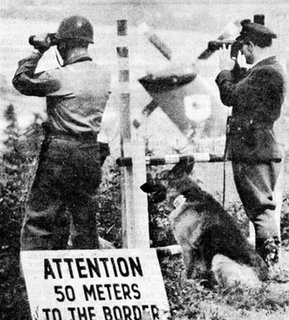
Waiting for Adam and Eve to sneak across
I believe that’s Michael in the middle, with the wings on the back of his head.
It wasn’t just the perfume manufacturers who were into purifying the soul from the things of this earth. Shakespeare did it with his sonnets, and the monks up in the Black Forest and the Tyrol made schnapps, or spirits, if you like, and drank it purely to purify their faith.
Here’s my translation of the last half of Shakespeare’s sonnet 5, from my book Living Will.
If no-one in the past had picked rose petals,
distilled perfume and stopped it up
in vials of cut glass, pink and glowing,
just like you, the prick of beauty
would be lost to us when we grow old;
we’d have no memory of it and how
it made us tremble. But the petals are picked,
and even if they’re brushed on an old
man’s cheek, they’ve only lost their colour;
their scent goes straight through me still.
But imagine! God purified to a taste! What would make you want to stop?
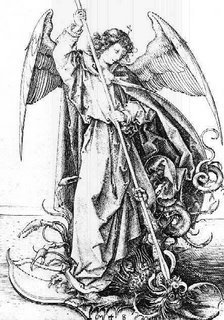
for Making Schnapps,
or is that the correct procedure for drinking schnapps, or the correct procedure for shucking a crab, or...to heck with it. To your health!
When the monks got tired of making spirits, although who could grew tired of that, eh, with a cider press with a twenty-five foot long handle to get lots of juice out of those hard little wild apples, and the little copper still in the back barn, with its long spout like something out of an alchemist’s workshop, they made spirits out of the flowers, too, and you can buy it down at the B.C. Liquor Store, those flower liqueurs, those little bottles of God, for sale, special this week, free samples, don’t drink and drive, and at Christmas you can buy a Teddy Bear to help the kids.
Like the Catholic church, the B.C. Liquor Stores run on guilt.

The shocking scene that greeted Adam and Eve
when they left the Garden of Eden
God shops for his gas price signs at thispdf brochure (160K).
But, you know what? It’s the checkout girls I feel sorry for. Men haul the food of the world into the supermarkets with trucks and palettes and forklifts, yet it all goes out again, one block of cheese, one box of Ritz Crackers, one turkey at a time, lifted by a 16-year-old high school clerk with a nervous smile and talking to her friends on the late shift about what a drag it is to break a fingernail, yeah I just broke one last week.

as the Archangel Gabriel, wearing enough cloth for an entire bridal party.
Hubert and Jan van Eyck painted this image in 1432 for the altar of the cathedral in Ghent. Gabriel shared responsibility with Michael for guarding the Garden of Eden
And you’re a forty-seven-year-old father of two daughters, and you think, "My God, they’re dressed up like goddesses of hearth and home, but they’re just girls. What are they doing here in a place like this?"

Sigourney Weaver in her Forklift Suit, ready to battle the Alien out of the Cargo Hold
And then I think, shouldn’t you girls be running from there, too?
I mean, the most popular torture device in the middle ages, next to the rack, of course, which was a lovely piece of work which could add twelve inches to your height by separating all your joints, so they could be reset by a physician, so they could be pulled apart again, so they could be pulled apart again, so that... oh, stop it. The next most popular was the pear.
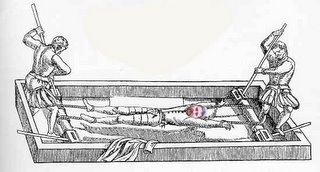
trying to add a little height to my 5’7" frame, and, by the looks of it, waiting for a mouse to come and take the bait.
Makes me look like Gulliver in Lilliput, doesn’t it.
Ah, not just any pear: the oral pear, the anal pear, the vaginal pear. It had a handle with the head of a devil, like a pear fruiting spur, and it had a stem, which was a corkscrew, and it had a pear, which opened in four leaves, and each leaf had a spike on the end, just like one of the petals of the pear blossom on the bottom of each pear, and it opened up inside your mouth and ripped your mouth apart, or opened up inside your anus or your vagina and tore you to shreds, and this was how you got a confession of guilt out of someone when you were bound to the holy law that you should not kill. People were bound to confess, and then the killing was justified.
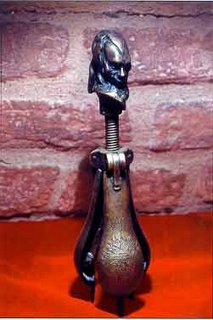
And the supermarkets don’t sell that stuff, not in the least. They just sell food, that’s all, yet even for that we sell our communities down the river: the tomato fields and peach orchards of the Okanagan, poof, the lettuce fields of Beaverdell, poof, the tomato fields of Ashcroft, poof, all sold for Mexican peppers and California lettuce and those plastic strawberries from California, and this year, for the first time, from New Zealand, brought in by air freight and ozone burn. As for the strawberry plants we used to grow under our young apple trees, who does that anymore? The wooden boxes we had for those. Who does that anymore? The girls shove it through, one piece at a time: how many tons a day? This isn’t the wholesome feeding us. This isn’t a fertility ritual. This isn’t youth renewing our civilization.

Looks like the girl on the left was a little ahead of her time.
But, it’s a job, you know. God knows, that’s important. And then some of the girls, well, stay. God knows, that’s important. After a decade of that, though, they get allergies in the floral department, but, that’s ok: the guy at the pharmacy department helps them out. They get traded to the deli department, and by this time they’re 28, with two kids, and a husband driving a logging truck, which ain’t no way to earn a living, that’s for sure, but lots of men do it, because, well, you get to drive around in a big truck, right. Your wife just slices meat. Then the woman in the deli department, who’s 35, gets traded to the bakery, while the head cashier is 58 and looks forward to going out once a year for a week with the husband and the dogs to go hunting. They all spend the nights together in the camper, cuz, well, you know, there are bears.

For ten unknown and maybe unknowable factoids about Polar Bears, go here.
It ain’t easy getting back into the Garden of Eden, once you’ve left it, is it.
So, Tim Treadwell goes into the Alaska Peninsula to track bears, to film bears, to live with bears, to be with bears, to go wild, and the bears finally kill him. He comes home in a bag. He is cut out of the stomach of a particularly hungry and desperate forty-one year old bear. He gets way too close. There’s a line between people and bears, and the people of Kodiak island never cross it, and the bears never cross it, and it has been that way for six thousand years, and everyone is alright. Tim Treadwell crossed it.
What happens when you cross that line with pears?

From Improbable.Com.
Bears of the world, I think there’s a way. A simple way involving levers and inclined planes:

If it worked for the monks, who’s arguing.
State of the World Report, 2005:
Pears in overabundance so we dip them in anti-fungal agents and stack them up forty feet high in concrete warehouses, in controlled atmosphere storages, and they bleed their volatiles, and we vent it out into the sky, because, we tell ourselves, it’s the best we can manage. No it’s not. The monks used to capture that stuff and let all the rest of the pear go. Closer to our time, men used to build cold storages into the sides of hills. The earth would keep the storage from freezing, and you could let in cold air at night from the top. A pear that came out of there tasted like a pear. It tasted like the earth.
Now the book industry I gave up a pear orchard for ain’t worth shit. It’s gone, has vanished, that old volatile. Now the pear orchards are gone as well, and the pears we bred to save them?
They weren’t pretty enough for the grocery stores.
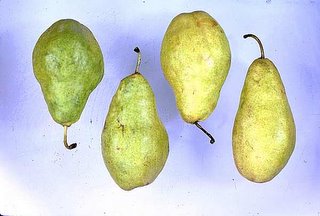
daughter of the pear breeding program at the Summerland Research Station.
Sierras are long and thin like gourds, and with 25% sugar, but they aren’t grown because they have thin skins and mark up when the wind knocks them against a branch.
Here’s what Thoreau had to say about the matter, in his essay Wild Apples:
I doubt if so extensive orchards are set out today in my town as there were a century ago, when those vast straggling cider orchards were planted, when men both ate and drank apples, when the pomace-heap was the only nursery, and trees cost nothing but the trouble of setting them out. Men could afford then to stick a tree by every wall-side and let it take its chance. I see nobody planting trees today in such out-of-the-way places, along the lonely roads and lanes, and at the bottom of dells in the wood. Now that they have grafted trees, and pay a price for them, they collect them into a plot by their houses, and fence them in, — and the end of it all will be that we shall be compelled to look for our apples in a barrel.
Either that, or the Archangel Gabriel can show us the way.
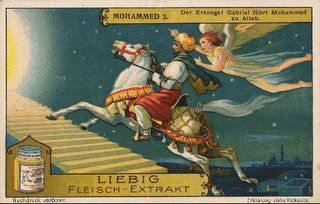
Guiding Mohammed to Allah
while the rest of the world sleeps
and throwing in a little advertisement for beef bouillon powder on the side.
In contrast to the great institutionalization of society represented by supermarkets, when the ship workers in Gdansk, Poland, formed an independent trade union, that’s to say one unaligned with the Communist Party, they were not agitating for shorter work weeks, improved orthodontics provisions and better pensions, nor did they have political intentions, as unions do in British Columbia today. In fact, when two Trotskyites from Mexico came to the shipyards and volunteered their services to help the riveters and welders achieve their goals, the union leader, Lech Walesa, had his men gently and cooperatively show them the door, and then informed them that they would never have entry to the plant again. The uprising, said Kapuscinski, was not politically motivated. It was, instead, a demand for "human dignity."

But, wait? Doesn’t he look photoshopped in?
The first quasi-democratic parliamentary elections in Poland were held on June 4, 1989. With a nod to Ronald Reagan, the Solidarity Union printed posters of Gary Cooper playing the sheriff in High Noon, emblazoned with the red banner of the Solidarity Party and the date. The Communists ridiculed the poster as an American, Wild West gimmick, something that would not appeal to Polish patriotism. The Poles, however, saw a Cowboy, dressed in a white shirt, fighting for justice in a lawless desert, while everyone else sat around in complacency.

It is fitting that the genre of the Western was invented by Jews from Poland and Russia, who translated their stories of the Cossack Pogroms into stories of truth and justice in the American West, helped free Poland from its institutionalization under Communism.
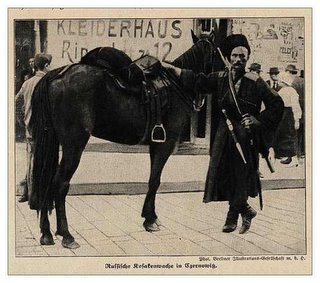
A Cossack Captured by the Germans During World War I
Note the German with the Gary Cooper hat in the background
Note as well the Archangel Michael’s sword hanging from the cossack’s belt.
Who knew?
When Communism finally collapsed in Poland, the country was thrown into a capitalist economy overnight. People sank or swam. When East Germany reunited with West Germany, the experience was different. Having had to pay for garrisoning the occupying Russian Army for forty years, East Germany was a complete ruin. Every house in the country was falling down. Not a single can of paint had been applied since the end of the Second World War. This is scarcely an exaggeration. Check it out here and weep. East Germany now has new freeways through old wheat fields, American fast food restaurants in small towns in the valleys below, West German supermarkets, and immediately upon reunification suffered the closure of the small, "Auntie Emma" corner groceries, run by single old women — independent enterprises smelling of pickles and low-quality mustard which had survived all the years of communist rule. The pear trees behind the houses are untended. The pears fall into the grass.
It’s no wonder. Most shopping in East Germany was done in supermarkets. There you had to order the whipped cream for your Sunday cake at the beginning of the previous week. Sometimes you were allowed to place an order for any amount of cream — as much as you could carry away. It didn’t matter, though: there wasn’t any cream, and there hadn’t been any for a long time. For a tin of pineapple (available only for holidays) you had to stand in line for hours, and then pay eleven Marks for a single tin. You could even stand in line for a Mon Cheri chocolate bar from Italy, which was worth it because you’d never get to Italy yourself. No wonder supermarkets were such a hit when the wall fell down.
On the other hand, before the Tante Emma shops wallowed in their mustard, Germany was graced with Tante Anna shops.

Tante Anna shops were also known as Colonial Wares shops — what, looking back the other way, we might call delicatessens. This is what those East Germans lining up for Mon Cheris were hankering for, as sinful as it might be: a little bit of the taste of the spirit of the world. Back in the 1920’s, they ranged from prosperous stores and bakeries to little kiosks from which a single owner could sell a few specialized goods, to try and make ends meet — kind of like the little belt and sunglass and jewelry shops that have sprouted up like stepping stones in malls across North America in the last few years. Beats selling beaded bracelets on a black cloth spread out on the street in the rain, doesn’t it. Here’s Woolworths' nod to Tante Anna.
There’s more than one way to lead a revolution. The East Germans did it through the gauntlet of supermarket lineups for non-present goods. Talk about manipulating guilt. Comrade Gabriel had nothing over those guys! The Soviets, on the other hand, did it by erasing people who had fallen out of favour. Literally. Here Lenin and Trotsky celebrate the second anniversary of the Russian Revolution in Red Square.
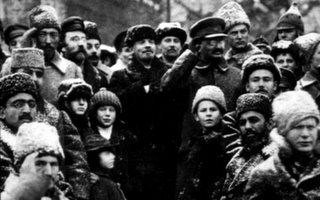
And here is the version that was distributed once Trotsky had fallen out of favour:
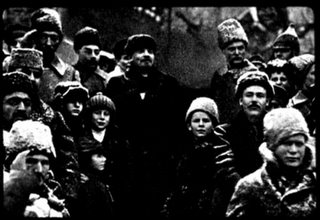
Trotsky, after He Became a Ghost.
When communism fell in British Columbia, first in 1973 when my father successfully — and I may say somewhat sadly — lobbied for the destruction of the centralized fruit selling system, and then finally in 2000, when the new Liberal revolution was given power and used it to dismantle all social agendas, Poland-style, there were very few pear trees left.
The pears fall into the grass.
Here’s a transcript from the afternoon sitting of the British Columbia Legislature on Thursday, October 11, 1973:
MR. PHILLIPS:I have been informed that members of the United Fruit Growers in the Okanagan Valley are talking of violence, are talking of militancy, and I have further been informed that some of them are starting to pack firearms. The members of this group feel they are justified in protecting their rights, their produce, their assets and their way of life. They know that a market exists in the lower mainland and are continuing to service that market.
The reason for the militancy is that they will no longer stand for the continued harassment they are receiving in moving their produce to market.
To which the premier replied:
HON. MR. BARRETT: Mr. Speaker, there are laws in this land that govern all people. If people make a conscious decision to break the law, it is their responsibility for making that decision - not on this House. Laws are made for people to obey.
The law under discussion prevented a farmer from selling his own fruit. It also protected the British Columbia fruit industry for 35 years.
Like, when you leave the garden of Eden, which way you gonna run?
Thisaway...

at the Allied Growers' Warehouse
These guys used to stop traffic at the boundaries of the fruit growing areas, and before their final effective collapse as an organization they asked the government to grant them the right to search every vehicle they stopped. The government said no.
or thataway?
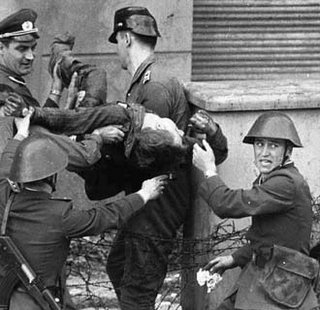
Their government said yes.
When did communism really fall in British Columbia?
Not yet. 94% of our land is still owned by the state, and the state still wants to torture it. Here’s a primer on the approved British Colombian torture methods.

Maybe it was always like that. People just like to cut trees down. Source.
So, here’s a question. Suppose a bunch of aliens come down to earth. They land behind your house and they ask you:
Alien: Have you seen any humans?
What are you going to say?
Harold: Hmmmmm. Not lately. But I think there are some hanging out at the sawmill across the valley. (Point. Wave as they fly off.)
It used to be you could be proud about a little thing like that.
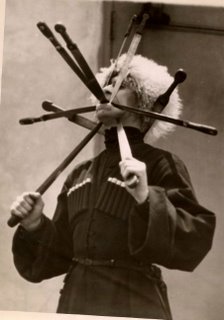
See what I mean? (Check him and his friends out!)
Before aliens started to trouble our dreams, the descendants of Galen’s Celts grew to love their pears over the centuries, and told their children stories about it like this:
"In the old days, pears in these parts were called 'Southerners'. When one of these beauties fell off a tree, three big strapping men had to be called to roll it down into a farmhouse cellar. To get the juice from it, you just had to tap it, like you wood a barrel, and the juice would flow freely out. You needed two other men with a crosscut saw to cut off the stem of the pear. After it was hauled by oxcart down to the lumber mill, wainscoting panels were cut out of it."
Now, that’s a pear tree!
I think we’re just going to have to get used to a different kind of pear, though. Actually, I think we already have.
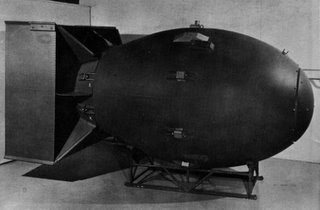
Notice the wing-like clamps and the chunk of the grizzly bear suit near the top.
Thing is, in Uitikon, a little town behind the celtic hill fort above Zurich, Switzerland, the view is down over old pastures, in which are planted pear trees that billow up like clouds, seventy feet high. You don’t pick the pears off those things. You let them fall like rain. I was there once on August 1, National independence day in Switzerland. The Swiss gave all foreigners a $50 break on their plane tickets, to get them out of town. There was a fire lit on every hilltop, all night. They glowed through the branches of those pear trees. This was the secret night of the Swiss. In Uitikon I learned that every small town has a high-tech factory. It keeps people on the land. That’s why the country industrialized in the first place: because of overpopulation of the land and a desire to keep people on the land.

In Canada, though, my father doesn’t grow pears any more. Neither do I. And this is the new Archangel Gabriel.

You can’t see him in the flesh, of course. He’s an angel, after all. But you can see him on DVD. This is called progress.
My daughters will not even own land, which is the one thing my father came to this country for.
The pears hang on the trees and glow. You pick them and feel their weight. The wasps crawl over them and suck their juice. They build moons among the branches.
And then it snows.
If you’re going to stick up a tree this Christmas, stick up a pear tree. There are no others.
And just remember: Gabriel is watching you.
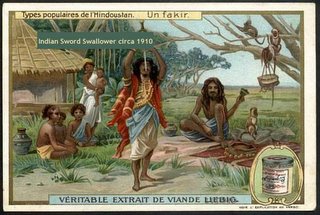
(as long as he gets his bouillon)
Next week: Dr. Faustus in Salzburg. Ezra Pound’s big gamble.
